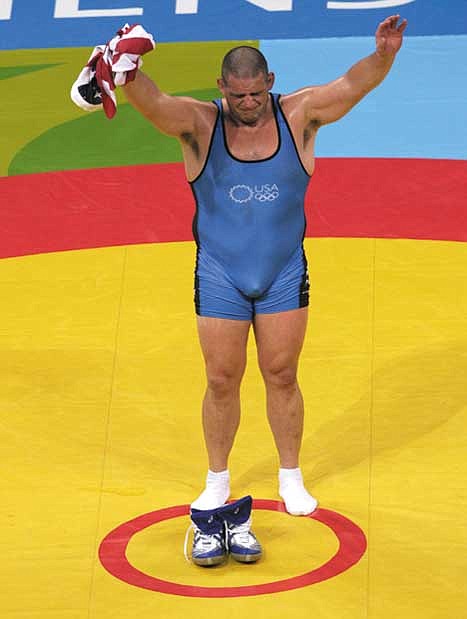Shoes on the mat, bronze around his neck, Gardner not saddened by loss of gold
ATHENS, Greece (AP) — Shed no tears for Rulon Gardner.
Yes, that really was Gardner, the only man brave enough to not just stand up to the invincible Alexander Karelin but to beat him, nearly bawling like a baby as he left his wrestling shoes at center mat in the Olympics.
The medal around his neck? Maybe it was only bronze, the color given as a consolation prize, rather than gold, the color given to champions.
To Gardner, it seemed to matter not at all.
Unlike Sydney, when only perfection was good enough to beat Karelin and perfection was his, Gardner was slightly flawed in Athens during his second and last Olympics.
A slight misstep cost him like no mistake on the mat ever did before, and he paid by winning the color of medal that real winners no doubt dread winning.
But if he felt disappointment at not being able to accomplish for the second time in four years what for even supreme athletes would be a once-in-a-lifetime feat, he never showed it.
”I came back and won a medal. Even though it's bronze, I have no regrets because I gave 100 percent in every match,” Gardner said Wednesday. ”I didn't leave anything on the mat.”
Except his shoes, of course. After wearing down Iran's much-taller Sajad Barzi for a 3-0 victory and the Greco-Roman wrestling bronze at 264 1/2 pounds, Gardner sat down on the mat, an American flag cradled in his arms, and took off his shoes.
Then, in a tradition nearly as old as the Olympics, he left them in the center of the mat — a career he never dreamed would be this good over, though the finish wasn't a storybook one like he wanted it to be.
Even the Greek fans who have whistled at and booed American athletes for nearly two weeks gave him respectful applause, understanding that while he may no longer be the champion, he's still a winner.
”That's it,” Gardner said, not long after he left the mat with tears rolling down his face. ”When you step off the mat for the last time, it's a big deal.”
What was curious about his final day as an active athlete was that Gardner's emotions held up much better in defeat than they did in victory.
Hours before, Gardner seemed to be closing in on a semifinal victory over Kazakhstan's visibly tiring Georgi Tsurtsumia. But, in a little more than a heartbeat, a slight misstep allowed Tsurtsumia to throw him to the mat out of a clinch and score the winning three points.
Just like that, the chance to go gold again, to meet yet another imposing Russian in the final, was gone. A Russian would again win the gold, only this time it was 21-year-old Khasan Baroev, not Karelin.
”One throw and that's the whole match,” Gardner said. ”One mistake.”
Or maybe two.
”I was surprised Rulon lost two clinches,” said Jeff Blatnick, a Greco-Roman gold medalist 20 years ago. ”I've never seen him do that when he's healthy.”
Or maybe it was three inches — the margin for error Gardner estimates he left for Tsurtsumia to attack.
”Three inches,” Gardner said. ”Three inches make the whole difference in the world.”
Still, Blatnick doesn't think Gardner sullied his wrestling legacy by not winning a second Olympic gold. To Blatnick, beating Karelin assured Gardner's place in the sport's history, and always will.
”He'll be remembered as an Olympic champion and a world champion,” Blatnick said. ”People forget he won the world championship the year after Sydney and proved it was no fluke. I don't think he did anything wrong in this match. (Tsurtsumia) was well-coached and knew exactly where to attack.”
Gardner's retirement — he's moving to Utah with his new wife and may become a high school coach — ends an impossible-to-script career that saw him become one of America's most improbable sports stars. And, after he won the gold, one of its most star-crossed.
Eighteen months after ending three-time Olympic champion Karelin's 13-year international winning streak with his ”Miracle on the Mat” in Sydney, Gardner lost a toe — and nearly his life — to frostbite after becoming stranded in the Wyoming wilderness.
This year alone, he survived a head-on motorcycle crash and, days later, badly dislocated his right wrist during a pickup basketball game, briefly jeopardizing his return trip to the games.
Why did he come back in the first place? Maybe it's because, deep down, he's still the aw-shucks Wyoming farmboy who ignored hurtful taunts of ”Fatso” to pursue his sport, to achieve its ultimate prize and create a niche as one of America's least likely but most-liked Olympic champions.
It is that devotion to and respect for wrestling that drove him to come back, to ignore the temptation to be like Mary Lou Retton and let a perfect Olympics be his only Olympics.
”People asked me, 'Why go back and take the chance you'll lose and tarnish your record?”' he said. ”I don't look at it as tarnishing anything.
”One mishap cost me the chance for the gold, but I'm happy with the bronze and I'll move on,” Gardner said. ”It's not quite a gold, but it's a medal.”
Become a Subscriber!
You have read all of your free articles this month. Select a plan below to start your subscription today.
Already a subscriber? Login



